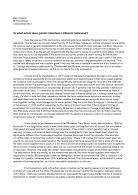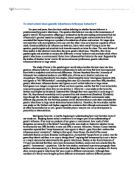According to Freud, Herr K. was involved through association of the jewel case and the fire which recalled the smell of tobacco from his breath. Dora remembered she dressed quickly in the vacation house, as in dream, her bed was in an expose hall. The fire symbolised the sexual attraction that Dora admitted to start feeling for Herr K. The fire led to thoughts of water that recalled childhood memories of bedwetting and masturbation. Freud believed the dream substituted Dora’s Oedipal attraction to her father for her current, conflict-laden attraction for Herr K. In the dream Dora wished to run away with her father and to be protected from her maturing sexuality just as she was protected by him from her bedwetting as a child. She fulfilled the wish when she followed her father to a business trip so the dream ceased to recur.
Dora seemed to accept Freud’s interpretation but shortly after she stopped with the therapy. In retrospect, Freud realised that he failed to carry his interpretations of the dreams because he didn’t explain why the dream recurred in the middle of therapy. Freud believed Dora was ambivalent to Freud due to his cigarette smoke smell and the use of “There can be no smoke without fire”. They openly discussed highly charged sexual topics what made her flee to her father because, i.e. Freud became her new Herr K. so she quitted the therapy. Although the therapy failed, Freud became aware of transference feeling – patient transfers motives and attributes of neurosis causing people onto the therapist.
To understand Freud’s explanation we have to be aware of culture of his time; the Victorian era considered women incapable of leading roles and they were raised to have children and run the household. Their bodies were seen as temples which should not be adorned with jewellery nor used for physical exertion or pleasurable sex.
There are many therapists that disagree with Freud because they believe that Freud turns the tables on the woman: he makes the victim of sexual advances into their perpetrator, but the woman must punish herself for these wishes. This punishment, this repression, creates Dora's hysterical symptoms meaning her hysteria is self-induced, i.e. caused by her self-repression of her own sexual desires, not by her disgust with Herr K.'s intentions. Kanzer (1980) believes the imagery of fire and water in Dora’s dream as examples of universal symbolism - the biblical accounts of the flight from Egypt, suggesting that Freud's uneasiness to apply these clues in Dora's case is connected to his counter-transference problems. Freud consistently perceived Dora’s more readily desire to flee from him than her desire to remain and be seduced by him, although his own analysis unmistakably demonstrated this. He insisted that transferences were taking place between Dora's attitudes to Herr K. and himself, and he tried to win from her acknowledgment of her sexual responsiveness to Herr K., he was unable to press this parallel as far as he himself was concerned.
Although Freud insists on the scientific empiricism of his method and it is based, he claims, on pure observation, it’s obvious that his work is judgemental and very subjective as I mentioned above and many would decipher displaced and condensate the images of water and fire differently (Freud vs. Kanzer). The main scope was that the patient's symptoms didn’t disappear during analysis; they occur only afterward and were postponed by transference. After Dora’s case we have an impression that the duty of the woman is to embrace sexual submission. The analytical situation models this relationship of mastery and submission. What is transferred are not so much the sexual desires of the female patient onto the male analyst as the power-politics of the male analyst to control his female patient.
Importance of the use of the dreams in therapy has been tested throughout the years by some empirical studies. Hobson’s and Solms’s first major empirical difference concerns the neurophysiologic origins of dreaming. According to Hobson, the lower levels of serotonin and nor epinephrine during REM, when combined with high levels of acetylcholine, make dreaming state very different from waking, providing it with several distinctive characteristics, such as bizarreness. They assume that the content of everyday dreams reflects the dreamer’s waking states and concerns. Research findings have revealed that the occurrence of recurrent dreams, nightmares and unpleasant everyday dreams is related to one’s psychological well-being. For instance, it has been found that understanding a disturbing persistent dream can reduce its occurrence and its associated distress (Webb & Fagan, 1993). In 2001 Hill did the empirical research that has shown that dreams’ pleasant or unpleasant content has a vital function in gaining from dream interpretation. Empirical studies suggest that dream pleasantness leads to higher levels of hope and openness towards conflict resolution, whereas unpleasant dreams have a negative impact on clients’ progress, as remind to the dreamer the unresolved conflicts or impeding threats.
Dream interpretation appears to constitute an effective therapeutic tool; dream interpretation, when considered active during psychotherapy, brings unique benefits to clients that may not be obtained by using some other therapeutic interventions. In addition, we must take into account that the therapist’s crucial role contributes a lot in dream work’s efficacy.
Anna Freud and Melanie Klein are the founders of child psychoanalysis and held deep beliefs in the richness and complexity of childhood and development, appreciated the suffering that children know, and valued play therapy as a means for understanding and healing. The two women, however, disagreed on much else.
Klein saw the child’s play in therapy as the equivalent of adult’s free associations and as the vehicle to making interpretations directly to even very young children’s unconscious. She especially focused on what she perceived as the young child’s experiences of abandonment, envy, and rage.
Anna Freud’s methods were more measured, aimed at helping children come to consciously understand why they thought, felt, and behaved as they did, that insight inviting personal change. She respected the child’s behaviour and defences as the child’s best attempts to cope with their anxieties, traumas, life experiences, and growing up. She promoted parent guidance and school consultation as important functions of the child therapist.
The basic goals of psychotherapy play therapy are quelling anxiety, help to overcome trauma, adjust to life events, cope with illness, and learn self-control. The therapist must make a child to feel comfortable and by proving himself safe and trustworthy over time, he steadily convinces the child that she has found someone with whom she can pursue and share this self-exploration. The therapists dealing with abused children must keep their opinion neutral to child’s conflict so that child can confine in the therapist and also explore by himself what his needs sadism serves. The therapist should pay attention on counter-transference. The therapist needs parents’ cooperation, i.e. they better he involves them, the better results will be. Parents can tell us how the child behaves at home, at school, among siblings or peers and the therapist should listen to parents carefully and treat them with respect. The therapist tries to educate and inform parents about development, especially their child’s.
There was a case of 8 year old Wendy who referred to therapist because of debilitating anxiety and school phobia. Wendy frequently stayed at home due to stomach-ache accompanied by nausea and fever. Her doctor found her to be in a good physical health. Her parents described her as isolated and asocial, she clung to her mother and would never accept a play date outside of her home; Wendy appeared very unhappy. First few months, Wendy was cool toward the therapist but acknowledge she didn’t want to go to school but was eager to do everything to change this. The therapist encouraged parents to keep her at school and bring her at the sessions. The commencing work consisted of Wendy’s drawings of happy children playing what was contradicting her state of mind. Gradually Wendy became more connected with the therapist and talked less about her physical pain and more about what’s going on in her life. She was retelling these stories enviously and admitted she wants her parents and teachers to see how special she is. By admitting her anger at children who were more capable to enjoy in growing allowed Wendy to start pursuing, enjoying centre stage in a way she previously could only yearn for secretly and bitterly but she failed at home where she maltreated her family and as things were getting better as she hit a therapeutic wall. After a few weeks she broke down and sobbed in mother’s lap for the whole session. The next day mother called the therapist and said Wendy never seemed happier. After a few weeks, Wendy and the therapist piece by piece discovered what happened. Wendy was jealous of her younger sister and had murderous thoughts. At the end she admitted “I have to grow up, don’t I?” Growing up is a painful enterprise, Wendy had tenaciously hung onto childhood, hoping she could hold off what nature demands. Therapy allowed her to grieve all that she imagined growing up would cost her, making room for her to live a more mature and full life, a life that was, to her surprise, bringing her a satisfaction, pride, and joy that she’d never imagined possible.
The empirical study of psychoanalytic play therapy has been sparse and weak. The vast majority of research has been in the form of the case study, the in-depth and subjective analysis of a single child’s treatment. For many decades, The Psychoanalytic Study of the Child—an annual volume published originally by Yale University Press - has presented many such studies as well as theoretical essays by the world’s foremost analytic clinicians. These writings have often been exceptional in their observations and insights but they do not equal experimental and controlled findings. The kind of clinicians who are attracted to such an in-depth, detailed, rich, complicated form of treatment are less likely to be interested and skilled in research. Second, the methods of psychoanalytic play therapy (e.g., interpretations, empathic listening) cannot be standardised the way that a behavioural intervention or cognitive-behavioural strategy can be. Third, many of the goals and experiences of psychoanalytic therapy - ego growth, self-awareness, and comfort within one’s own skin - again are not that easy to define and assess quantitatively. Fourth, psychoanalytic therapy is as much art as science. On the surface, three child therapists can say and do everything identically and yet have very different effects on the child.
In conclusion, psychoanalytically-informed play therapy can be a powerful form of treatment. But it can sometimes be lengthy, costly, hard, and painful for both children and their parents. For the child therapist, learning and mastering psychoanalytic play therapy can be demanding, both intellectually and emotionally. It requires conviction and personal involvement and yet it’s very subjective and cannot be generalised.







